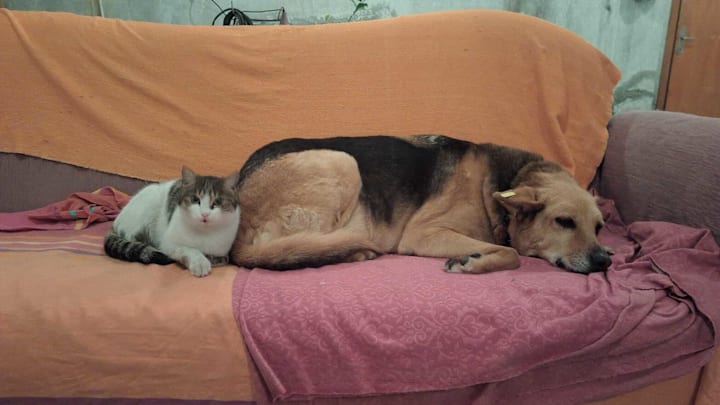What's good and safe for humans is not always safe for our pets, leading to hundreds of thousands of calls to the ASPCA's Animal Poison Control Center (APCC) every year. As much as we try to keep our cats' and dogs' safety in mind, sometimes accidents happen and they end up eating things that they shouldn't. But knowing what the most common substances that the APCC receives calls about can help us know what we definitely need to keep out of our pets' reach.
The American Society for the Prevention of Cruelty to Animals (ASPCA) posted a report about the most common toxic substances pets were exposed to in 2024, based on the number of calls received by the APCC about specific substances. Here are the top five substances pets are most exposed to at home, so you can make sure to keep them out of your pet's reach, whether you have a dog or a cat.
Top 5 toxic substances pets are exposed to at home
1. Human over-the-counter medications
In 2024, the APCC received the most calls about pets that were exposed to or ingested human over-the-counter (OTC) medications. This includes supplements like vitamins, but also things like Ibuprofen and Tylenol.
While not all human vitamins are toxic to pets, several of them are, especially iron and vitamin D supplements. Medications such as Ibuprofen and Tylenol are also toxic to pets and should be kept out of their reach. Many instances of poisoning occur when medication is dropped accidentally, and our pets may ingest it.
It's important to call the APCC or your vet if your dog or cat ever ingests any human medication, no matter what it is.

2. Human food and drinks
Human food and drinks encompass a broad category of substances, but the APCC receives a large number of calls yearly about dogs or cats that have ingested human food, especially if the food was left unattended. While a lot of human food is safe for dogs and cats, especially if its plain, many seasonings and even some fruits and vegetables can be toxic to them.
Some of the most toxic human foods that are toxic to dogs and cats include:
- Alcohol
- Coffee/caffeine
- Garlic (including garlic powder)
- Grapes and raisins
- Onions (including onion powder)
Some of these substances can show effects sooner than others, so anytime your dog or cat ingests human food and you're not sure if it's safe for them, call your vet or the APCC as soon as possible.

3. Human prescription medications
Our dogs and cats can also get into our prescription medications that we accidentally drop or leave open on the counter. Because prescription medications target specific things and are often stronger than OTC medications, this can make them even more dangerous for our pets.
If a pet ever ingests any of your prescription medications, it's important to reach out to a vet or the APCC immediately. It also helps to know the generic name and dosage of the medication as well as how much your pet ingested so that action can be taken quickly.

4. Chocolate
If you're a pet owner, you pretty much know that chocolate is bad for your pets. But, chocolate can be irresistable to pets, especially dogs, and the APCC stills receives a lot of calls about chocolate every year. In the best case scenario, chocolate can cause vomiting and diarrhea, but in the worst case scenario, chocolate can lead to seizures or death for our pets.
Some forms of chocolate are also worse than others. For example, cocoa powder is more dangerous than other forms of chocolate. But the amount of chocolate your pet ate based on their weight can determine how serious it is. So, reach out to the APCC or your vet as soon as possible and let them know what kind of chocolate your pet ate and how much they weigh so they can come up with the best plan of action.

5. Veterinary products/pet medications
Rounding out the top five most toxic substances pets are exposed to in our homes are veterinary products/pet medications. Often, these medications are designed to be more appealing to pets and may have delicious smells or tastes. This could lead to our pets ingesting more than is recommended if the products aren't put away.
Pets can overdose on medications, too,and the most common that cause problems are medicines used to treat arthritis and urinary issues. According to Dr. Tina Wismer, Senior Director of the APCC, "Overdoses of that medication can cause high blood pressures and seizures."
So, we especially want to keep our pets' medications, even CBD products, away from them, and reach out to the APCC or your vet if your pet ingests more than the recommended dose.

Other toxic substances pets are exposed to at home
Although the five substances above are what the APCC receives the most calls about, there are other toxic substances our pets can ingest that need to be kept out of their reach.
- Plants and fungi (especially lilies)
- Rodenticides
- Household cleaning products
- Insecticides
- Recreational drugs (including marijuana)
Any time your pet ingests something outside of their normal diet, it's important to reach out to an animal professional for advice, especially if they start showing symptoms.

The best way to keep your pet safe from ingesting any toxic substances is to pet-proof anything that can be dangerous to them. Make sure the whole family is on board to ensure that medicines and other dangerous products are put away, and that everyone is aware of what foods pets shouldn't eat.
If your pet ever ingests something they shouldn't and your vet's office is closed, you can call the Animal Poison Control Center at (888) 426-4435. They are available 24/7, 365 days of the year.
